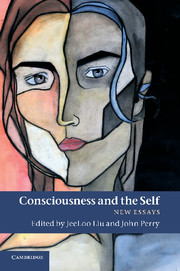Book contents
- Frontmatter
- Contents
- Acknowledgments
- Contributors
- Introduction
- Chapter 1 Awareness and identification of self
- Chapter 2 Self-representationalism and the explanatory gap
- Chapter 3 Thinking about the self
- Chapter 4 Ordinary self-consciousness
- Chapter 5 Waiting for the self
- Chapter 6 I think I think, therefore I am – I think
- Chapter 7 Knowing what I want
- Chapter 8 Self-ignorance
- Chapter 9 Personhood and consciousness
- Chapter 10 My non-narrative, non-forensic Dasein
- References
- Index
Chapter 5 - Waiting for the self
Published online by Cambridge University Press: 05 December 2011
- Frontmatter
- Contents
- Acknowledgments
- Contributors
- Introduction
- Chapter 1 Awareness and identification of self
- Chapter 2 Self-representationalism and the explanatory gap
- Chapter 3 Thinking about the self
- Chapter 4 Ordinary self-consciousness
- Chapter 5 Waiting for the self
- Chapter 6 I think I think, therefore I am – I think
- Chapter 7 Knowing what I want
- Chapter 8 Self-ignorance
- Chapter 9 Personhood and consciousness
- Chapter 10 My non-narrative, non-forensic Dasein
- References
- Index
Summary
Hume’s thesis
In one of his most famous passages, Hume writes:
[W]hen I enter most intimately into what I call myself, I always stumble on some particular perception or other, of heat or cold, light or shade, love or hatred, pain or pleasure. I never can catch myself at any time without a perception, and never can observe any thing but the perception. (Hume 1739, 252)
This remark admits of various interpretations: metaphysical and phenomenal, strong and weak. Here I want to defend a strong phenomenal version of Hume’s view. I want to argue that there is no phenomenal quality corresponding to the subject of experience – no phenomenal I.
This topic has been much discussed by philosophers, and, like Hume, most tend to rely on intuitions, introspective reports, and contestable transcendental arguments. My review will begin with Descartes, but I will be more interested in assessing lines of research that treat the phenomenal I as a topic for empirical inquiry. There have been a number of recent attempts to identify a subject of experience using the techniques of contemporary brain science. I will consider some of the more promising proposals and argue that they come up short in important ways.
Keywords
- Type
- Chapter
- Information
- Consciousness and the SelfNew Essays, pp. 123 - 149Publisher: Cambridge University PressPrint publication year: 2011
- 4
- Cited by

